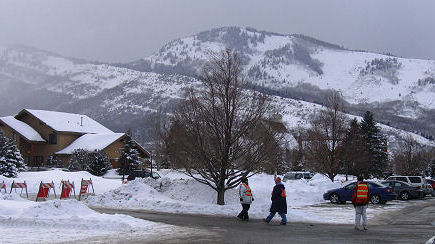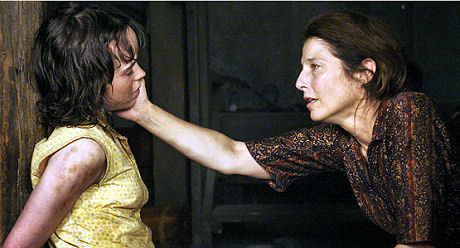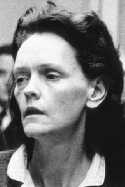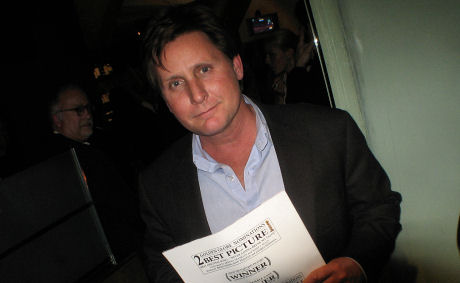Park City/Sundance Film Festival weather projection for Thursday, 1.18 through Saturday, 1.20: Partly cloudy. Highs in the upper 20s. Lows zero to 5 above.

Park City/Sundance Film Festival weather projection for Thursday, 1.18 through Saturday, 1.20: Partly cloudy. Highs in the upper 20s. Lows zero to 5 above.

I can’t think of any journalist who’s been a more impassioned Dreamgirls fan that The Envelope‘s Tom O’Neil, so it’s significant that he wrote yesterday, “Surrender, Dreamgirls fans — The Departed is now officially ahead for the Best Picture Oscar. When the top Critics’ Choice Award went to The Departed on Friday night, it was the last bit of evidence I needed to change my prediction.”
O’Neil’s conclusion was fortified “a day earlier when I heard a third academy member over two days tell me that they planned to vote for The Departed. The only other film they even considered was Little Miss Sunshine. They liked Dreamgirls, even admired it, but they didn’t flip over it, didn’t feel it was their movie — not one targeted to old straight white geezers.”
Some kind of A to Z rundown of 2007 movies, the precise rhyme and slant of which I don’t quite get. Most of the films are listed alphabetically, but not all. Maybe there is no rhyme or slant.
“How do you light a man on fire, blow seven others to bits, choreograph a gun battle with 20 shooters, discharge 400 special-effects squibs, shatter a panoramic hotel window, separate an FBI agent’s torso from his waist, then show a neo-Nazi to his seat — which happens to be a chain saw — all in mere minutes?” So reads Sheigh Crabtree‘s opening graph in her 1.14.07 L.A. Times piece about Joe Carnahan‘s choreography of a big final sequence in Smokin’ Aces (Universal, 1.26). Show a Nazi to his seat which happens to be a chainsaw….?
Directed by Francis Lawrence (Constantine) and co-written and co-produced by Akiva Goldsman, I Am Legend (Warner Bros., 12.14.07) “is testimony to the unexpected durability of Richard Matheson‘s 1953 novel,” writes Lewis Beale in the N.Y. Times.

“It’s a taut, realistic chiller about a post-apocalyptic world in which germ warfare creates a biological plague that turns humans into bloodsuckers.
“The idea was born, says Matheson, now 80 and living in the Los Angeles area, ‘when I was a teenager and saw Bela Lugosi in Dracula. I thought if the world was full of vampires, it would be more frightening than just one, and I explained vampires in biological terms.’ In the book, some vampires have developed a pill that keeps the disease in check and allows them to live relatively normal lives. This element now plays as an AIDS metaphor, though the book was written 30 years before H.I.V. was even identified.”
One nagging question: I Am Legend‘s premise is different from any generic roving-zombie film in what way exactly? It’s an old idea….a tired one, even. And the fact that Lawrence is directing should give everyone pause. Constantine convinced me he’s in the realm of Stephen Sommers badness. Constantine, remember, got a 46% positive Rotten Tomatoes rating.
Alec Baldwin‘s directorial debut The Devil and Daniel Webster, which I did some reporting on in late October, will finally be released after five years of collecting dust….but not theatrically. “Page Six” says it’ll show up on Starz on Demand with a new title (Shortcut to Happiness), and, like I wrote several weeks ago, with Alan Smithee (or some such pseudonym) credited as director. The drama stars Baldwin, Jennifer Love Hewitt and Anthony Hopkins.

Yesterday afternoon Deadline Hollywood Daily‘s Nikki Finke reported that Martin Campbell’s Casino Royale passed $540 million Friday night and officially passed Die Another Day globally as the biggest-grossing Bond flick ever. It’s gathered $161.2 million in the U.S,. thus far, but “the really big bucks have been coming from international theaters where the spy pic stayed #1 for weeks and weeks in 50-plus countries. The estimate is for Casino Royale to end up with as much as $575 million in theatrical worldwide revenue.
It’s 3:14 am and I’ve just finished reading the Wikipedia document about the late Gertrude Baniszewski, a.k.a. “the Torture Mother” — a hugely disturbed Indiana woman who instigated and organized the prolonged torture, mutilation and eventual murder of Sylvia Likens, a teenage girl she had taken into her home, in the early 1960s.

I read this history because of Pat Broeske‘s 1.14.07 N.Y. Times piece about a movie about Baniszewski’s beyond-ghastly deed — Tommy O’Haver‘s An American Crime, with Catherine Keener portraying Baniszewski.
O’Haver’s film is playing at the Sundance Film Festival (Eccles on Friday, 1.19, at 9:30 pm, and then at the Racquet Club the following morning at 8:30 am, followed by a third screening at the Sundance resort on Sunday), and I’m asking myself — it’s now 3:22 am — do I really want to see this film? Along with a second filmed drama about the Baniszewski case, Gregory Wilson‘s The Girl Next Door, which isn’t playing Sundance but, according to Broeske, has been submitted to the Tribeca Film Festival?
I’m trying to imagine how watching O’Haver’s version won’t feel like an endurance trial of some kind — a film you see at Sundance so you can say to yourself, “I’m not a dilletante…I grimmed up and got through it,” and then half-brag about this to others. This is the scenario, in any case, that Broeske’s article has put in my head.
A friend who’s seen An American Crime says “it is a bit of an endurance test at times, but it really doesn’t show anything that graphic… it’s more like Hard Candy where the ‘thought’ of something being done is more intense than actually seeing something. It’s worth seeing for the performances by Keener and Page, who are both amazing.”

The Wikipedia page says that while Baniszewski “played an active role in Likens’ death, the majority of the torture that eventually brought about Likens’ demise was carried out by Baniszewski’s teenage children and other neighborhood children. Although Baniszewski did instruct the children on several occasions, it was later discovered that they took a large degree of Likens’ torture into their own hands, in what would later be called a Lord of the Flies scenario come to life.
“When Baniszewski was convicted of first-degree murder in 1965, the case was called ‘the single worst crime perpetrated against an individual in Indiana’s history.'”
Years have passed since producer-manager Victoria Wisdom said in a Hollywood Reporter piece that “‘Sundance’ spelled backwards is depression.” But her words come back every so often.
I…uhm…half-apologize for saying earlier today that David Poland is a member of the Dreamgirls “team.” Poland answers to no one but his own voice, apparently, and he has no particular ties to Dream- girls that results in his being a “member of the team.” (I’m vomiting on my rug as I say this.)
Poland obviously supports the idea of Dreamgirls winning the Best Picture Oscar, of course, but he’s not in the pocket of or unduly allied with anyone on the DreamWorks/Dreamgirls posse. I thought that was thud-obvious, but a certain party wants this pointed out anyway.
This said, let me make something very clear. I am a member of the United 93 team in the sense that I admire that film like few others, and I have no concerns about admitting this at all. I believe in people’s willingness and ability to understand this statement in the right way. I’m also a member of the Children of Men team, the Lives of Others team, the Departed team, the Little Miss Sunshine team, the Babel team, the Pan’s Labyrinth team and so on. And proud of it. I believe in solidarity, in teams, in standing together with the right films and the right people for the right reasons.
Another finger-to-the wind Dreamgirls observation, this one from Newsweek’s Miki Turner.
